

Eskoms Khulu Phasiwe on NERSA's decision. Nersa to decide on Eskom tariff increase:Tuesday 12 May 2015. Eskom wants Nersa to approve a price increase of over 25 % for the current year.
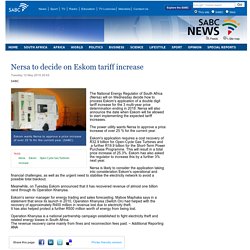
(SABC) The National Energy Regulator of South Africa (Nersa) will on Wednesday decide how to process Eskom's application of a double digit tariff increase for the 3 multi-year price determination ending in 2018. Nersa will also announce the date when Eskom will be allowed to start implementing the expected tariff increases. The power utility wants Nersa to approve a price increase of over 25 % for the current year. Eskom's application requires a cost recovery of R32.9 billion for Open-Cycle Gas Turbines and a further R19.9 billion for the Short-Term Power Purchase Programme. Nersa is likely to consider the application taking into consideration Eskom's operational and financial challenges, as well as the urgent need to stabilise the electricity network to avoid a possible total blackout.
Cosatu threatens strike over Eskom tariffs :Tuesday 24 March 2015. Eskom has announced that tariffs for direct customers will be increased by 12.69% on April 1, and tariffs for municipalities will be raised by 14.25% in July.
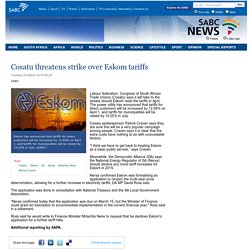
(SABC) Labour federation, Congress of South African Trade Unions (Cosatu) says it will take to the streets should Eskom raise the tariffs in April. The power utility has announced that tariffs for direct customers will be increased by 12.69% on April 1, and tariffs for municipalities will be raised by 14.25% in July. Cosatu spokesperson Patrick Craven says they are sure this will be a very popular campaign among people. Craven says it is clear that the extra costs have nothing to do with unavoidable factors. Tariff hikes unlikely to save Eskom: Sacci:Monday 23 March 2015. Sacci’s Janine Myburgh says Eskom’s primary energy costs, mainly coal, increased from R19 billion to R70 billion in the last six years.
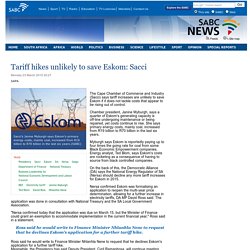
(SABC) The Cape Chamber of Commerce and Industry (Sacci) says tariff increases are unlikely to save Eskom if it does not tackle costs that appear to be rising out of control. Chamber president, Janine Myburgh, says a quarter of Eskom's generating capacity is off-line undergoing maintenance or being repaired, yet costs continue to rise. She says primary energy costs, mainly coal, increased from R19 billion to R70 billion in the last six years. Myburgh says Eskom is reportedly paying up to four times the going rate for coal from some Black Economic Empowerment companies. Joburg City Power to implement residential time of use tariff system:Tuesday 24 February 2015. The system will allow City Power to price electricity at different rates during the day to encourage consumption during off peak hours.
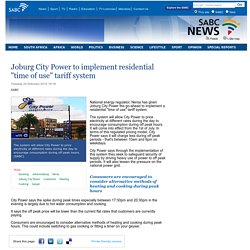
(SABC) National energy regulator, Nersa has given Joburg City Power the go-ahead to implement a residential "time of use" tariff system. The system will allow City Power to price electricity at different rates during the day to encourage consumption during off peak hours. It will come into effect from the 1st of July. City Power’s bid to reward off-peak electricity users okayed by Nersa:Tuesday 24 February 2015. The "time of use" system is aimed at saving electricity usage during peak hours.
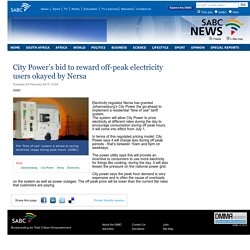
(SABC) Electricity regulator Nersa has granted Johannesburg's City Power the go-ahead to implement a residential "time of use" tariff system. The system will allow City Power to price electricity at different rates during the day to encourage consumption during off peak hours. It will come into effect from July 1. In terms of this regulated pricing model, City Power says it will charge less during off peak periods - that's between 10am and 6pm on weekdays. The power utility says this will provide an incentive to consumers to use more electricity for things like cooking, during the day. City power says the peak hour demand is very expensive and is often the cause of overloads on the system as well as power outages. No electricity hike until 2015:Tuesday 13 May 2014. Every year Eskom submits actual costs of operations to Nersa.
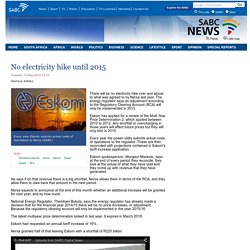
(SABC) There will be no electricity hike over and above to what was agreed to by Nersa last year. The energy regulator says an adjustment according to the Regulatory Clearing Account (RCA) will only be implemented in 2015. Eskom has applied for a review of the Multi Year Price Determination 2, which applied between 2010 to 2012. Any shortfall or overcharging in those years will affect future prices but they will only kick in 2015. Every year the power utility submits actual costs of operations to the regulator. Eskom spokesperson, Mongezi Ntsokolo, says at the end of every period they reconcile, they look at the actual of what they have sold and they come up with revenue that they have generated. He says if on that revenue there is a big shortfall, Nersa allows them in terms of the RCA, and they allow them to claw back that amount in the next period. The latest multiyear price determination kicked in last year.
Electricity tariffs taking toll on businesses:Wednesday 31 July 2013. Nersa was briefing Parliament's Portfolio Committee on Energy.
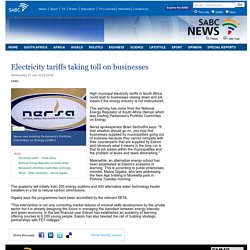
(SABC) High municipal electricity tariffs in South Africa could lead to businesses closing down and job losses if the energy industry is not restructured. This warning has come from the National Energy Regulator of South Africa (Nersa) which was briefing Parliament's Portfolio Committee on Energy. Nersa spokesperson Brian Sechotlho says: "If that situation should go on, you may find businesses supplied by municipalities going out of business because they cannot compete with their counterparts that are supplied by Eskom and obviously what it means in the long run is that its job losses within the municipalities and the problem of levies and taxes diminishing.
" Meanwhile, an alternative energy school has been established at Eskom's academy of learning.